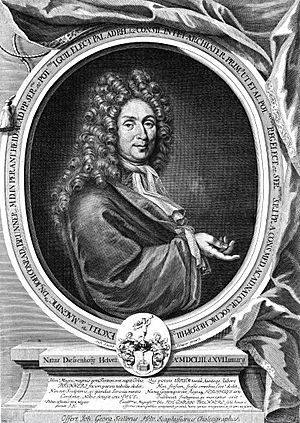Johann Conrad Brunner facts for kids
Quick facts for kids
Johann Conrad Brunner
|
|
|---|---|

Portrait of Johann Conrad Brunner
|
|
| Born | 16 January 1653 |
| Died | 2 October 1727 (aged 74) |
| Education | Schaffhausen, Strasbourg and Paris |
| Medical career | |
| Profession | anatomist |
Johann Conrad Brunner (born January 16, 1653 – died October 2, 1727) was a smart doctor from Switzerland. He was an anatomist, which means he studied the human body and how it works. He is especially known for his important discoveries about two body parts: the pancreas and the duodenum.
Life of Johann Conrad Brunner
Brunner was born in a town called Diessenhofen in Switzerland. He studied medicine in many cities, including Schaffhausen, Strasbourg, and Paris. In Schaffhausen, he learned from Johann Jakob Wepfer, who was also his father-in-law.
He finished his medical studies and earned his doctorate degree in 1672 from the University of Strasbourg. In 1686, he became a professor. He taught anatomy and physiology at the University of Heidelberg.
Later, in 1716, Brunner became the personal doctor for Charles III Philip. This ruler was the Elector of the Palatinate. Brunner received many honors during his life. He was even given a special title, "Brunn von Hammerstein." He passed away in 1727 in Mannheim, Germany.
Brunner's Discoveries
Johann Conrad Brunner is remembered for his experiments and studies. He focused a lot on the pancreas and the special liquids it produces inside the body.
In 1683, he did an experiment where he removed the pancreas from a dog. He noticed that the dog then became very thirsty. It also produced a lot of urine, a condition called polyuria. Brunner thought there might be a link between the pancreas and diabetes. However, he couldn't fully explain how the pancreas caused this disease at the time. He wrote about his findings on the pancreas in a book.
In 1687, he described tiny glands in the duodenum. The duodenum is the first part of your small intestine. These glands were later named Brunner's glands after him.
Sometimes, these glands can cause problems:
- Brunner's gland hyperplasia: This happens when Brunner's glands grow too much.
- Brunner's gland adenoma: These are small, non-cancerous growths that can form from Brunner's glands.
 | James Van Der Zee |
 | Alma Thomas |
 | Ellis Wilson |
 | Margaret Taylor-Burroughs |

